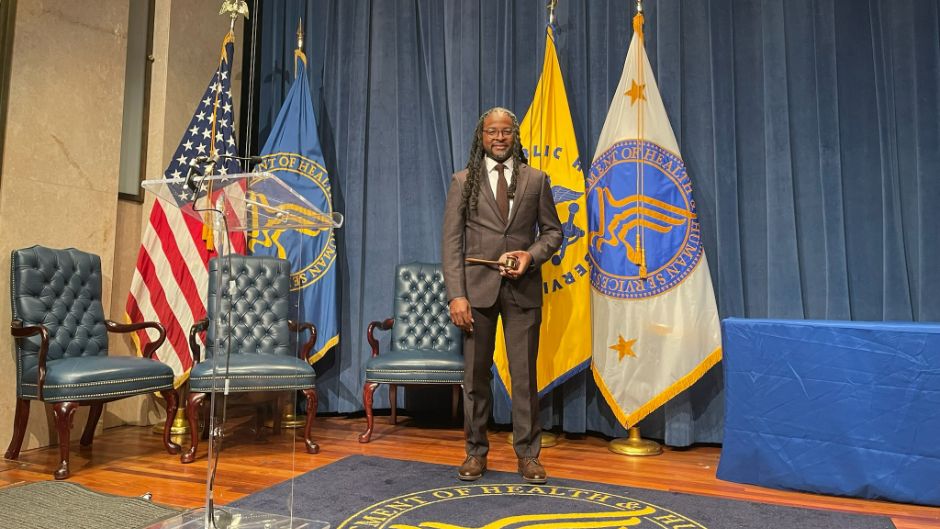Even though he had dreamed of being a lawyer as a child, Jewell Reddick, J.D. 14, latched on to becoming a pharmacist as a 14-year-old. He loved science and was drawn to helping people, and after a high school visit to a university's pharmacy school, he thought his future was set in stone.
"Pharmacy seemed like a logical way to do science daily and to help people," he said. "I visited Florida A&M University's College of Pharmacy in high school and shadowed two professors. The students and professors seemed like family how they interacted, and I knew I wanted that environment."
He received his Doctor of Pharmacy degree from Florida A&M University in 2007, working in a staff pharmacist position over the next several years.
"From my earliest memories of what I wanted to do as a career, I wanted to be an attorney," he said. "I got to high school and fell in love with science. In my mind, science and law were not related.
"During my first year of pharmacy school, I attended a conference, and one of the speakers was a PharmD/J.D. It was like a lightbulb went off in my head," he said. "I went back to campus and asked to double major. At the time, I was told I would need to choose one or the other. I had already taken all of the difficult science courses then, so I decided to continue with pharmacy.
"I promised myself that if I finished pharmacy school and was not happy, I would go back to law school. At the fourth-year mark of practicing as a pharmacist, I was unhappy, and I remembered the promise that I made to myself. I signed up for the LSAT and applied to law schools," he said.
The now 41-year-old Reddick fell in love with Miami Law. The campus was beautiful, and he was impressed by the School of Law recruiter.
"Ultimately, it was Professor Charlton Copeland that sealed the deal for me," he said. "I had met him through mutual friends, and he was an amazing ambassador for the law school."
In the end, Copeland would be the keystone to Reddick's arch. In his 3L year, the D.C. Semester in Practice was launching under Copeland's tutelage, and Reddick, a self-described "political junkie," was hoping to practice in the nation's capital.
"I signed up for the program and participated in the first cohort of students," Reddick said. "During the week, I interned at the U.S. Department of Health and Human Services, Departmental Appeals Board in the Medicare Operations Division," he said. "One weekend per month, Professor Copeland would fly up and teach us about the Federal Regulatory State. The experience was amazing. I got to do real work while making connections in the city that I wanted to return to."
In under a decade, Reddick would rise from HHS intern to administrative law judge—the first HHS intern to do so— a move he says would have been far more difficult if not for the Miami Law program, entering federal public service, and being named to the position this early in his career.
"Becoming an ALJ has been a wonderful experience," Reddick said. "Shifting from advocating for a client to being the ultimate decisionmaker and deciding which party is right has been challenging, but it has caused me to grow. It is sobering to know that the decisions I make in cases have real world effects for the parties. I take this responsibility seriously and I am honored to be of service to the public."
He also said that Miami Law was a perfect fit for him as an older student and provided numerous opportunities to network throughout the program through receptions and speakers.
"Miami Law also had a number of really helpful student-led organizations that would bring in speakers and provide career information," he said. "I participated in the Historic Black Church Program with Professor Alfieri, which was great exposure to the community and public service.
"Ultimately, the greatest asset that Miami Law provided was the faculty. The professors were always willing to give of their time and contacts to help me secure internships, etc. I was able to intern for a Federal District Court Judge in Washington, D.C. the summer of my 1L year through the Judicial Internship Opportunity Program. Professor Copeland connected me to a former clerk of the judge, and I was able to ask questions prior to my interview," Reddick said. "[Former Miami Law] Professor Osamudia James was invaluable to me as well. Even after I finished Miami Law and was no longer her student, she provided career advice and wrote many letters of recommendation."
Read more about Miami Law’s experiential learning opportunities.

